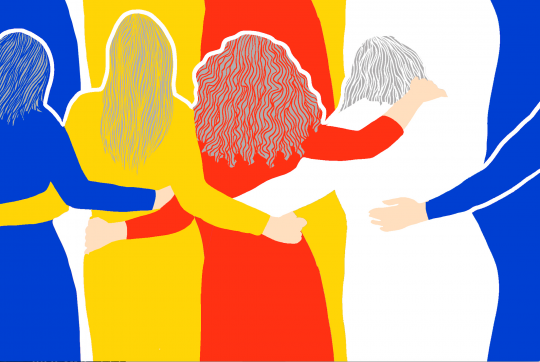‘No woman should have to ask a strange man for a sanitary pad’

We say: ‘Make yourself at home’. I don’t know about you, but for me feeling at home is, above all, not being constrained by anything
I remember above all the embarrassment. That moment when I had to pull a classmate or later a university friend aside and whisper to ask them for a pad or tampon. I am much better at it today, largely thanks to the fact that, through the efforts of many individual women and entire organisations, the subject of menstruation is slowly ceasing to be taboo. I also spent a lot of time working it out in my head. I had a time a few years ago when I often wrote while sitting in the university library. Entry with a rucksack was forbidden, your laptop, wallet, notepad and other essentials had to be put into a completely transparent university bag. So for a few days a month I was faced with the dilemma of whether to put the spare sanitary pad in the bag with all the other stuff, or discreetly slip it into the back pocket of my trousers in the cloakroom. I chose my trousers for a long time, but over time I started putting it in my bag and practising not caring what some random student or professor, putting his notes and computer from his backpack into his bag who right next to me, will think if he casually glances in my direction and finds out I’m on my period. I’ve learnt not to cower within myself, not to look away or make nervous movements, but honestly? I have not been able to overcome the discomfort. Even though menstruation was talked about openly in my home, even though I am a feminist and a fairly open person, I still would rather not tell a colleague at work that I feel bad because of my period.
These thoughts have come back to me in recent days, when two million refugees have arrived in Poland from Ukraine, most of whom are women and children, and among these children there is a huge number of teenagers. We welcome them into our homes and host them as best we can. We feed, we make beds, we entertain children, and mothers are drawn into daily activities. We say: ‘Make yourself at home’. I don’t know about you, but for me feeling at home is, above all, not being constrained by anything. By a not very chic tracksuit, a messy haircut, a pose on the sofa that you wouldn’t sit in at the office or on the bus. Being a host is not easy, but – especially in the current situation – being a guest is far more difficult. Receiving help is all the more troublesome the less we have, and the people who are in our homes have not come – as guests do – with a bottle of wine or flowers for the hosts and sweets for their children. They stood in our doorway in whatever they were wearing, possibly with a smaller or larger bundle. The Ukrainian women we host not only do not have their favourite dresses, neat potted plants from the windowsills of Kiev and Kharkiv houses, or perfume, but often do not have a penny to their name, so they are completely dependent on us. And since it is certainly difficult for them to ask, we must be able to anticipate their needs. I can feel the searing shame that a person whose period has started and does not have a pad or tampon feels. It is worth thinking about this in the context of your guests. Asking for hygiene products can be extremely difficult when it comes to talking to the hostess, and impossible if there was a need to talk to the host. No woman should have to ask a stranger for a sanitary pad. Therefore, the best solution seems to me to be simply to lay out everything a person with menstruation needs in the toilet. This will certainly make the already difficult stay in our homes easier for Ukrainian women. Especially the very young ones who have just joined our children’s classes. I know this well, because the fear of a stain on my trousers is also something I remember well from my girlhood years. It has not passed to this day either.

